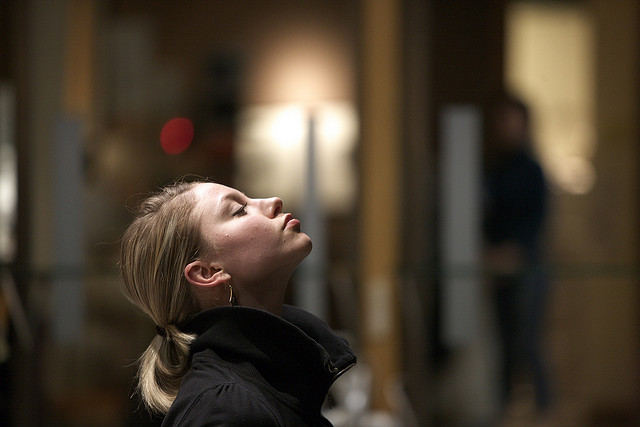
What is normal?
As small children, we believe that everyone’s experience is identical to ours. As teens, we torture ourselves over our complete inability to be “normal,” despite our desperate mimicry of each other. As adults, we gradually accept that normal is, at the very least, unique to specific groups and cultures.
But as adults, we also have the capacity to recognize when an aspect of our personal normal is, in fact, abnormal.
That’s why we go to therapy, right?
We observe friends and acquaintances and begin to deduce that something is different. This person can have a fight with her mom and not fall apart emotionally afterwards. That person can poop in a public toilet. Almost everyone uses time and money on the clock for anything but work! We want to address our differences and live a “normal” life.
I realized in my mid-20’s that my anxiety was not normal.
Convinced of the power of talk therapy and self-improvement, I embarked on a non-pharmaceutical treatment plan. After all, I didn’t need medicine to just be “normal.” I saw a psychologist for a year. I did the Artist’s Way curriculum: a mindfulness book study (written by Julia Cameron) designed to help artists access their creativity without fear. I followed the Joy Diet (written by life coach Martha Beck) to the letter. I began a meditation practice and sat in silence 20 minutes every day. I wrote my life mission and broke it down into smart goals to achieve my dreams. But it wasn’t enough.
My mindfulness was concurrently a beautiful and terrible cycle: wheels within wheels.
My mind ran on and on without ceasing, despite all the good things I was mindfully doing. I couldn’t understand that the constant critical voice in my head wasn’t normal.
You see, my brain just wasn’t able to control my anxiety. She tried hard. There was never lack of trying. But despite my mindfulness efforts, my meditation practice and my determined pursuit of serenity, my brain faltered. She didn’t have enough serotonin. I actually was one of those people: a person who needed drugs to be normal.
So years later, when a therapist suggested I try medication, I considered the option with full mindfulness. I didn’t want to take medication but my doctor was really eager to give me this medication. But an endless stream of worries started running through my head.
Does he think I’m stressed out or too anxious? I probably won’t get nearly as much accomplished while I’m on medication. But that’s okay, I can create my own reality. I’ll just create a reality where little to no accomplishment is okay. These pills won’t change who I am. It’s silly for me to be superstitious—I believe that anyone with mental illness can benefit from medication. I wouldn’t hesitate to take a pain pill, after all. I can always go off these pills. I don’t need to be hooked on them.
My life wasn’t really that bad. I mean, everybody enjoys periodically losing their temper and breaking things. It’s not like I’m hurting anyone. I’ll be fine. I’ll just take the pills and then see that nothing is different and I’ll go off them. I mean, I meditate, I pray, I set goals, I follow the Four Agreements. My relationships aren’t perfect but they work. Everybody is self-critical. They just won’t admit it.
Okay, fine, I decided I’ll try the pills.
And then, suddenly, silence.
Have you ever noticed that whenever you go outside to read or meditate, a lawn crew starts working? Riding mowers and leaf blowers blast their white noise into the air, wiping out the sounds of birds and squirrels and the occasional car. It’s annoying, but then comes the wonderful moment when they all stop and the silence in the air is thick like cream of potato soup. Then you can hear the birds singing and the squirrels scolding and the silence recedes as you hear nature’s sound track again.
That was what it was like in my brain two days after starting my pills. A clean, clear silence, thick with its absence. No voice reviewing and critiquing my words. No constant wincing over mistakes I perceived. No mindfulness of my mindfulness.
If I was tired, I took a nap. If I had work to do, I did it. When I spent time with people, I relaxed and said what I was thinking.
And the world didn’t stop. No one stopped speaking to me. I didn’t lose my job. I didn’t gain 20 pounds. I didn’t descend into a world of mediocrity. I didn’t lose my emotions.
Despite all the progress and education in the last 20 years, mental illness is stigmatized, and taking medication to treat it is seen as weakness. After all, no one wants to take a pill just “to be normal.” Sometimes talk therapy and meditation is enough. Sometimes working out issues and changing mental habits is all that is needed.
But sometimes a person needs both: medication and meditation.
Now that the lawnmower of anxiety is gone, I can hear the world as it is. I can hear the birds singing and calling. I can hear the wind blowing leaves from the trees. I can hear the rain pattering on the roof. I am truly mindful. And I proudly proclaim that my “normal” life is due, in part, to a daily pill. Because “normal” doesn’t mean boring, or chemically dependent or numbed out. It means the freedom to be yourself.
~
Relephant:
Medication or Meditation?
~
Author: Elaine Bayless
Editor: Caitlin Oriel
Image: Minoru Nitta/Flickr & r. nial bradshaw






Read 15 comments and reply